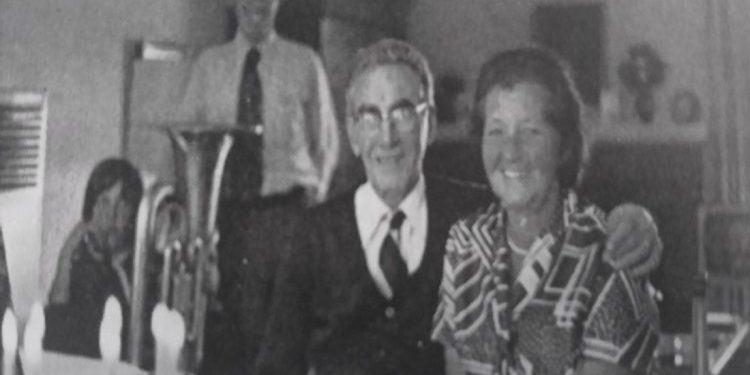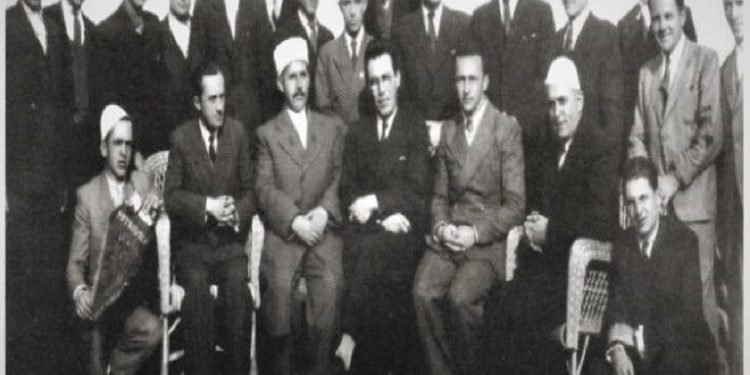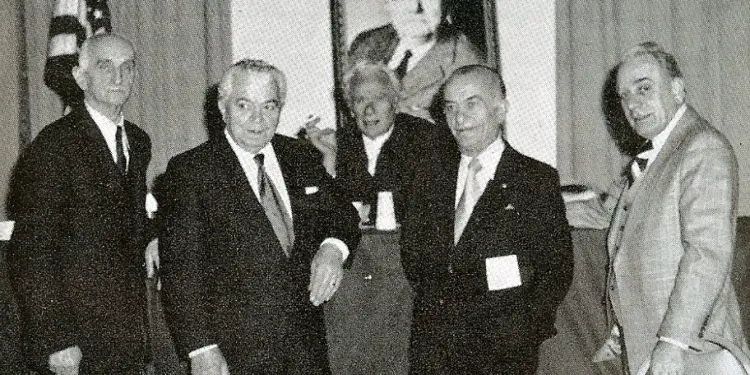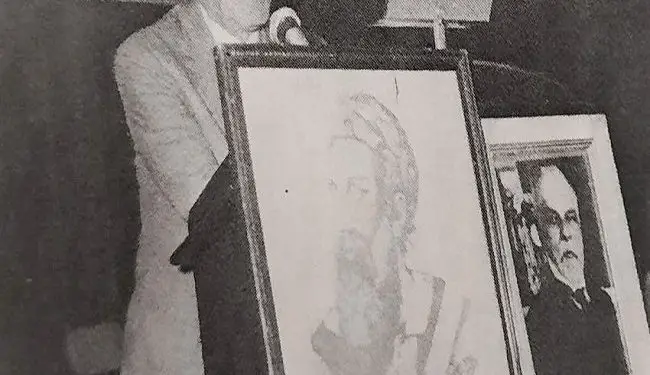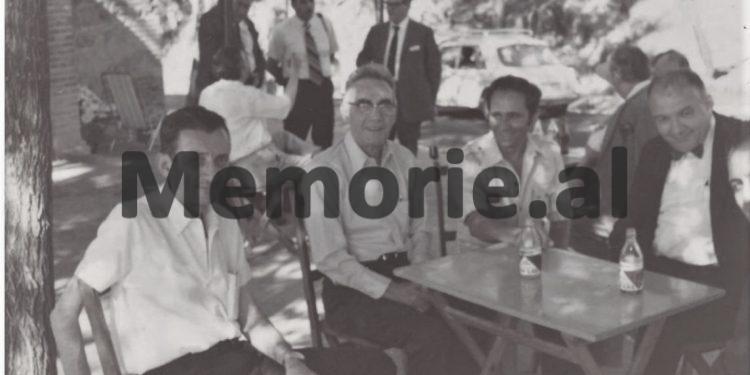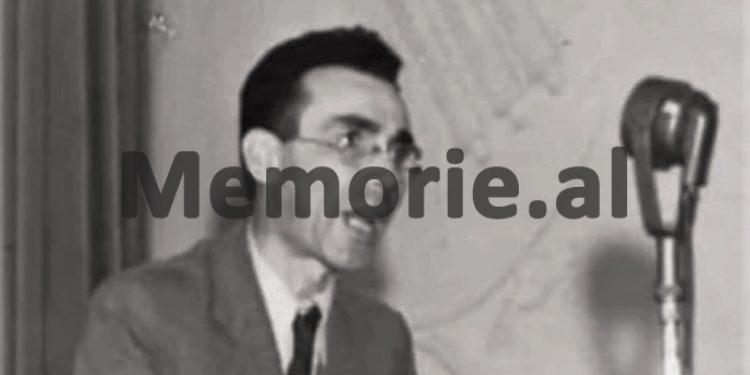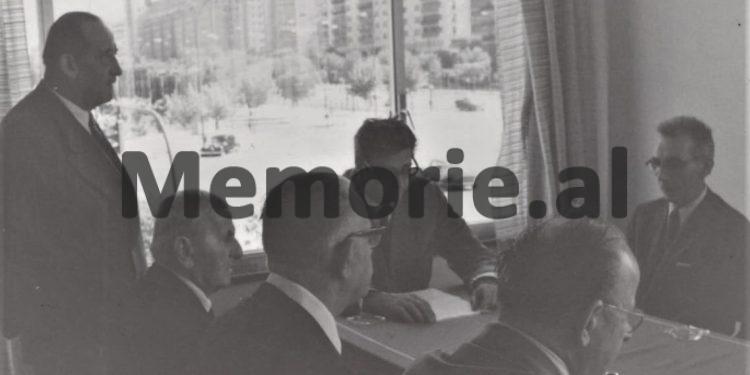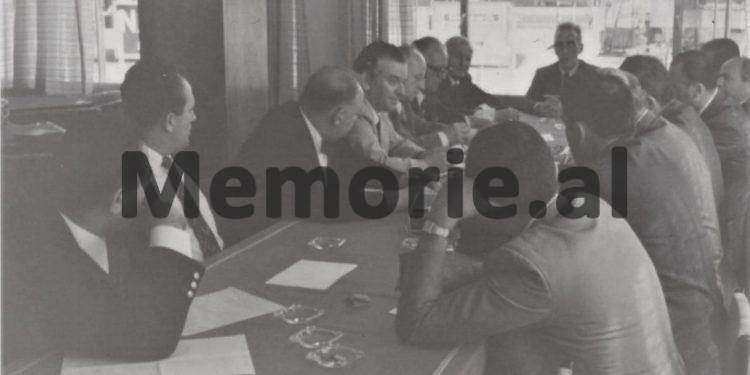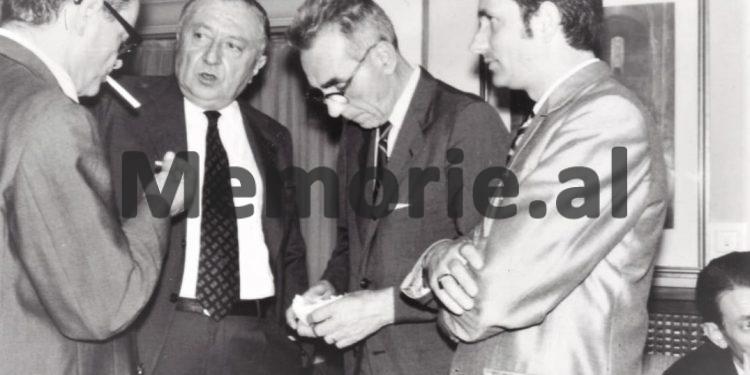By Idriz Lamaj
Part twenty-four
From the works of the apostles of ethnic Albania
Xhafer Deva
In light of his own letters and other diaspora revelations
Preface
Memorie.al/ Probably like many others, I often browse letters with my friends and associates, who are no longer in this life. Browsing through them, for a moment unfolds memories that it seems to me that some of them can serve our history. Then, I return to the awareness of the current difficult situation in the ethnic homeland, caused by the quadruple of Albanian politics, I say to myself: “What can my memories of others or the letters of the people of dead? ”
Without being the ominous instigator of pessimism, thinking as always of a better future, I return to my obligations to my friends, and as an icy observer of time, without any claim of historical service, when I am given the opportunity of publication, write what I have in mind, always based on their writings and letters. This principle is also followed in this book about Xhafer Deva. I knew Xhafer Deva in person; we exchanged visits and had a strong correspondence.
I spent days off at his house and inherited all of Xhafer Deva’s correspondence with Rexhep Krasniqi, his closest friend, for more than 40 years. After many years, I talked on the phone with Mrs. Deva’s daughter and son-in-law. In the conversation going on, taking advantage of the old friendship, I asked about his letters and they informed me that it was all Qefali Hamdia, a friend of their family.
In June of last year (2001) I went to Kenosha, Wisconsin, a guest of Qefali Hamdia, to look at Xhafer Deva’s correspondence, which Mrs. Deva sent her years ago, when she, due to her advanced age, was closed his house to go to the house of his 5th daughter and son-in-law, Mrs. Burgl Dagmar and Rev. Dennis Logie.
After reading the bulk of the letters, in the languages I knew, I took with me more than a thousand pages of his correspondence, covering a period of over 30 years, 1945 – 1978. Xhafer Deva spoke and wrote seven – eight languages. His correspondence is: Albanian, English, German, Italian, French, Turkish and Serbian. Xhafer Deva’s letters and writings, with the exception of those in Old Turkish and Serbian in Cyrillic, are mostly typewritten, well-kept, and alphabetically arranged, with the persons he dealt with.
That includes his family letters. He carefully kept a copy of every letter he sent and every letter he received. Mrs. Oswalda Deva, daughter Burgl, son-in-law Dennis Logie and Mr. Qefali Hamdia with family, expressed his heartfelt thanks for the trust they gave me. With special gratitude I recall here the help given to me by my brothers – Captain Nue Gjomarkaj and Nikoll Gjomarkaj, in the preparation of one of the most important chapters of this book.
Kapidan Nou, in addition to making available the subject on Xhafer Deva’s relations with the ‘Independent National Bloc’ and sending paratroopers to Albania and Kosovo, reviewed with me each document of that period, and we formulated the text in the form of a conversation; while Nicholas, deciphered the letters, transcribed and translated from Italian, the unpublished materials to date, which were published in this chapter.
Continues from the last number
Xhafer Deva’s life and activity in exile
– Kosovo in the time of Ethnic Albania –
Xhafer Deva in the light of his own letters
In the United States.
Xhafer Deva’s last message: – Keep alive the ‘League of Prizren’
The discussion is done to determine the credibility of the member. With all his declarations of allegiance and that he is one hundred percent a staunch communist, it is up to the cell leader to make the final judgment regarding his allegiance. To confirm this loyalty, the cell leader may require the member to perform extraordinary missions. These missions can go as far as killing an enemy of communism, or committing an act of sabotage. The final rehabilitation comes after the successful completion of the mission. This is the procedure followed with the shaky communists. Cell leaders stay behind the scenes and are never exposed. In this way they can better control the activity of members. After occupying a job in government or elsewhere, a cell member becomes a regular member of the illegal Party of his county and this means that he has been promoted one rank higher, which is the highest honor and service that becomes a person who has faithfully served the cause of the party.
As a party member they begin to meet other friends in their district. They attend regular meetings where they are given the opportunity to learn more about the party itself. Here they receive guidance and are permanently on missions in their area of work. They continue to transmit information, the assessment of which determines the degree of their intelligence. It is one of the principles of the communist system to keep its people engaged in missions. Now that we have reached this point we should not be surprised to hear of sudden revolutions, overthrow of regimes within a few hours by some officers in such Middle Eastern countries as Egypt and then Syria, and to conclude who knows where and when. The Russians worked in these countries for several decades, as they did in the countries of Eastern and Southeastern Europe. World War II took over the Baltic States, Poland, Czechoslovakia, Hungary, Bulgaria, Yugoslavia, Albania, etc.
Hunger and misery reigned in these countries before the war. In many of these countries the Communist Party had been established since 1920, but was unable to overthrow existing regimes and replace them overnight with communist regimes. This did not discourage the Russians and they continued their work equally not only in these countries but also all over the world. They are aware that a Third War means the same thing to everyone: total destruction. Therefore they continue their destructive work in the name of peace and achieve results wherever they can. During the occupation of Egypt by the British and some Middle Eastern countries by the French, the Russians had worked in these countries in the manner described above. The so-called lords of present-day Egypt, who actually serve Moscow’s interests there, the Nassers, the Tawfiqs, the Salahs, etc., are the product of this persistent activity of the Russians there. Just 5 years ago we witnessed a bloodless revolution in Egypt, which ended with the extradition of King Farouk and the establishment of the People’s Republic in this country.
This revolution was led by a group of young officers who had received instructions from their Russian masters to overthrow the existing regime, under the leadership of a general named Mohamed Naguid, a truly revered Egyptian figure. Naguid really loved his country and enjoyed great popularity among the Egyptians. They were able to draw him into their plans because of his patriotism and because of King Farouk’s unbearable behavior. He cooperated in good faith with the clique of those young officers for the good of the country and its people, but unaware that it had become a tool in the hands of Moscow, which was collaborating with Moscow spies. Before long and only three years after coming to power, the clique of new officers received orders to imprison Naguib, who had helped him come to power. He was removed from power and imprisoned. Shortly after this event, Nasser, in his capacity as president of Egypt, announced the nationalization of the Suez Canal. Moscow had captured the appropriate political moment and circumstances in the Mediterranean and North Africa, Morocco and Algeria.
Exactly the time when the British were dealing with the problems of Cyprus and the French with Algeria. The intervention of the British and the French brought to light that it was not Nasser and his clique who had declared the nationalization of the Channel. The British and French armed intervention in the Channel was met with a statement from Moscow stating that it would launch its missiles wherever necessary, in case the British and French did not immediately withdraw from the area. The only good thing the Western world got from this was that it found out who was running all of this. The nationalization of the Canal thus became an accomplished fact. The world realized that it was not Nasser in Egypt, but Shepilov, Khrushchev, Zhukov and others, who spoke on behalf of the oppressed Egyptians. Immediately after the so-called Channel crisis, came the Syrian crisis, where power passed into the hands of a military clique. Just like in Egypt, even in this small country of 4 million, there is a president named Shukri Couvetly, a rich man and therefore anti-communist.
Even this man, like Naguibi, assures everyone that Syria is not a satellite of Russia and that Nasser is a patriot, although he knows very well the fate and reasons for Naguibi’s imprisonment. Although anti-communist, this man speaks on behalf of a clique of army officers, who have gone through the same schools as Nasser with friends. Sooner or later the fate of this man will be at least similar to that of Naguib. I think that Egypt is the base of Russia, Syria will become such a base and it is up to us to judge how long it will take for other Middle Eastern countries to fall into the hands of Moscow. As we have said, all these events take place in the context of the efforts to conquer the Mediterranean; consequently they are a step towards domination in Europe.
Xhafer Deva read this political analysis at the American Military Academy in ‘West Point’. His lecture is published here for the first time in free translation from English.
Report
The borders of the new Albanian state, established in 1913, left more than half of Albania outside the homeland. Serbs and Montenegrins plundered the most fertile agricultural lands and were very rich in mines. Albanians left under Slavic captivity were mistreated, persecuted and even expelled from ancestral homes. The most inhumane methods were used on them. But the southern Slavs did not leave the independent part of Albania alone, but caused it internal turmoil. Thus, in 1924, an unsuitable regime was imposed on Albanians. During the Second World War, in the midst of the national liberation movement, many trained and qualified organizers (under the guise of communism), managed to deceive a part of the Albanian nationalists who threw them in the war against each other.
After a great deal of propaganda, in November 1944, the clique of Albanian communists, inspired and aided by the Slavs and taking advantage of the loss of the ‘Axis’, managed to impose its will by force, to establish a communist dictatorship in Albania. The final goal of the Yugoslavs to always keep the Albanian Communist Party under control is evident in the most documentary book published in 1948 by Vladimir Dedier entitled: ‘Yugoslav-Albanian Relations from 1939 to 1944’, a book that has been translated into Italian After the Second World War, the Yugoslavs had a free hand to easily realize their dream of the Adriatic, because from 1944 to 1948, Albania remained only formally outside the framework of the Federal Republic of The temporary and feigned break-up of Tito with Moscow caused the Yugoslavs to leave Albania, but this did not eliminate the pan-Slavic objective.
Albanians and Albania, due to Moscow’s side policy (represented by Belgrade), were blindly thrown into the Kremlin lap. The terror and famine always caused and based on the directives predetermined by Slavic politics and the rampant propaganda of the communists loyal to Moscow (who said that Yugoslavia had passed under Western capitalist influence), left many Albanian nationalist farmers and ranchers abandoned their country and flee to Yugoslavia in the hope of breathing more freely there. Faithful to Marxism-Leninism and fanatical to Pan-Slavism, the “New Yugoslavia”, certain that the Albanian refugees were almost all nationalists, arrested them, put them in concentration camps and even killed many of them, as it did with Captain Gjon Destanishë from Shkodra, or in 1948, with Halit Osmani from Arni i Peshkopisë, together with 18 wars from Dibra and Mirdita, this terror lasted until the beginning of 1951, when the tactics were changed after it was seen that the old method no longer worked.
In May 1951, the Organization of ‘Albanian Political Refugees’ was established in Yugoslavia, after first erasing from their minds every dream and every national pride. Here is noted the technical functioning of the organization as well as a part of its respective staff.
- The center of the organization in the beginning was Prizren, now it is Prishtina with permanent headquarters in the street “Crvena Armija” No. 2, Chairman (was Prof. Apostol Tanefi) now is Hajrullah Ishmi, Vice Chairman, Nik Sokoli, General Secretary (was Lutfi Spahia), now Ramadan Spahia.The close council consists of four members who are: Apostol Tanefi, Arif Starova, Qazim Lusha, Martin Camaj (who is under the strict supervision of the U.D.B.) Seven people form the executive of the organization This is also the Disciplinary Committee, the consultative or as they call it, the ‘Extended Council’, consists of 40 people, among whom the most important are: Caf Smajli, Nue Pjeter Gjomarkaj, Can Tahiri, Mark Ujka, Tajar Hatipi, Mark Gjeçaj, Sefedin Koleci, Xhevat Bekteshi, Tahir Repishti, Ugrin Shegani, Prenk Nue Dushi, Galip Sejdia, Shpend Sherifi, Nue Vojvoda, Lutfi Spahia, etc. From these comes the ‘Control Council’ that does not have permanent headquarters, but counter llon all refugees who are provisionally located there. This ‘Control Council’ consists of Chairman: Apostol Tanefi, Deputy Chairman and Secretary Tahir Repishti, members Xhevat Bekteshi, etc. etc.
It should be borne in mind that both the above-mentioned and the other members of the enlarged Council are the most prominent representatives of the provinces from which they come. The refugees are settled in the three republics of the federation, Montenegro, Serbia (in the Kosovo region) and Macedonia, where they have clubs and affiliates of the organization or sub-committees, which function in the same way as the Center Committee. Thus for the Republic of Montenegro, the Committee with permanent headquarters in Titograd, “Novaka Milosava”, “Albanski Politicki Klub”. The organ of the Committee is the “Flag of Freedom” which is published every month in six to eight pages in Pristina, but is edited in Belgrade. The staff of the newspaper consists of: Tajar Hatipi, Gani Sejdia, Mark Gjeçaj, Enver Zhudi, Loro Frano, etc. Behind the Committee and its representation stands the true military executive and police force made up of senior officers, and these are: General Dusan Mugosha, a member of the Executive Committee of the Communist Party of Yugoslavia, former Plenipotentiary Enver Hoxha.
Colonel Cedo Mijovic, important authority personally appointed by Mugosha on the issue of Albanian refugees in that country, Major Vlado Popovic, assigned to refugees residing in the territory of Kosovo, Major Pero Burzani, assigned to refugees in Montenegro, Colonel Zivko Sarkic, Major V. Kaplan, Inspector General, Major Vido Tomanovic based in Titograd, Major Vido Jovanovic for Ulcinj and Bar, Captain Nikola Boskovic, for Plava e Guci, Colonel Sfetan Vucic at the Serbian Ministry of Interior, he expects to all refugees and is interested in refugee students in Belgrade, and many other army and UDB officers (‘Uprava Drzhavne Bezbednosti’), almost all of these officers know the Albanian language very well. To prepare cadres of officers for a possible invasion of Albania, courses have been opened since 1951, as well as schools for Yugoslav officers, mainly Serbs and Montenegrins.
Thus in Prishtina, prof. Idriz Ajeti was forced to leave the teaching of the Albanian language three times a week at the Gymnasium of Prishtina, to go to Peja where a special course for officers was opened. Later, one was established in Prishtina. Today the courses are numerous. The most important is the one that functions in the Ministry of Interior of Serbia, where the Minister of Serbia, Mehmet Hoxha, who is an Albanian Tito, teaches. In the course of Prishtina, teach prof. Idriz Ajeti and Ali Rexha. The lesson takes place in the halls of the central UDB of Kosovo. Ing. Tom Berisha, teaches in Titograd. Other schools for officers have been opened in Gjakova, Skopje, Debar, Ljubljana, etc., where professors are well paid and are obliged to keep the state secret in the strictest way. This framework is openly prepared to change the clique of Enver Hoxha in order to return to Albania the situation of the years 1944-1948.
In order to complete the detailed description of the organization, we mention that in addition to political organizations, there are other sectors intended for operations in Albania. Such are: Sector of propaganda, social assistance, health, gymnastics and culture, etc. In the smaller centers where the immigrants are gathered, there is the same model of the center Committee that has all the sectors mentioned above with the base cell. Such actions take place in Emigrant Clubs in Prizren, Gjakova, Gjyrakovc, Podujeva, Ferizaj, Gilan, Viti, Hogosh (in Kosovo), in Niksic, Titograd, Ulcinj, Bar, Guci, Andrevic (Montenegro) and in Struga, Tetovo, Gostivar, Skopje (Macedonia) and others. The organization has a special care for new students who enter schools designated by UDB, they also receive a certain salary. Here we have to point out the fact that when a student escapes to the west, which are just a few examples so far, the center committee unmasks and then tries to increase the student quota.
All functionaries of Clubs or Committees, receive salaries as per the duties they perform, who more who less. They generally do not complain. The ‘Control Council’, which consists mainly of Serbs and Montenegrins, keeps money in suitcases. Regarding the external form, it is interesting to note that the organization of the Prishtina Committee is very similar to that of the National Committee “Free Albania”, which operates in the West./Memorie.al




